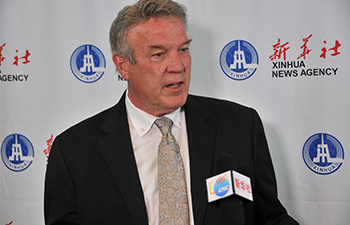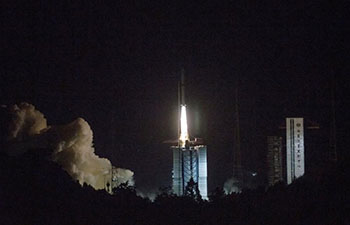GUANGZHOU, May 22 (Xinhua) -- Executives from a large number of U.S. companies, from multinationals to start-ups, have expressed growing interests in expanding their business ties with China, as the country has promised further opening-up.
Multinational manufacturer Procter & Gamble (P&G) last September launched a digital innovation center in Guangzhou, capital of south China's Guangdong Province.
With an investment of 100 million U.S. dollars, the center focuses on digital marketing, big data, artificial intelligence, intelligent supply chains, and technology incubation.
Matthew Price, president of P&G Greater China, said China's consumption upgrading was the reason his company launched the new center.
"We are actually designing products in China with Chinese scientists. We are exporting the innovation," Price said.
In keeping its promise of further opening-up, China has lowered import tariffs and unveiled a package of policies in the financial sector regarding market access, business scope, and infrastructure.
At the China (Guangdong)-U.S. Investment Cooperation Conference held last week, dozens of American companies from aviation, artificial intelligence, 3D printing, and clean energy sectors conducted promotions and road shows, to seek more business opportunities in China.
Susan Ying, vice president of Los Angeles-based aircraft start-up Ampaire, said her company is looking for opportunities to demonstrate its technology, hoping to form joint ventures with Chinese partners.
As China's growing middle class is more willing to buy products from abroad, many U.S. companies are taking advantage of e-commerce and digital technology to create a new driving force for their businesses.
American food products manufacturer Mars has formed partnerships with Chinese e-commerce companies such as JD.com, and plans to bring its products to world markets through this cross-border platform, according to the company's vice president Matthias Berninger.
Dai Fan, representative of the U.S. State of California and governor's special advisor on China, said as a pioneer in clean energy, carbon trading, electric vehicles and batteries, California hopes to deepen cooperation with China in these areas.
"We cannot achieve these goals on our own. We have to have a very close relationship and partnership with China," Dai said.
Myron Brilliant, executive vice president of the U.S. Chamber of Commerce, said he expects trade and investment between China and the U.S. will continue to grow.
Brilliant stressed the importance of engagement and dialogue between the two countries to address the trade challenges.
"There's so much potential in this relationship, and there's so much to be looking forward to, that we do not want disruptions in trade and investment between our two countries," Brilliant said.

















